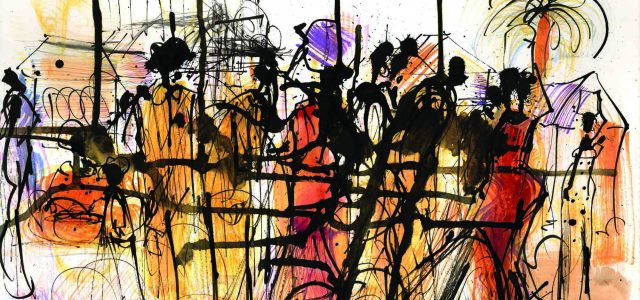
GADDAFI, MY FATHER AND ME…
With a new art exhibition about to open this month, Sherif Dhaimish reveals to David Fearnhead the improbable life of the artist known as Alsatoor
It was an April morning just like any other when a group of exiles arrived by coach outside the Libyan Embassy in London. They were there to protest the recent public hangings of two students in Tripoli ordered by the brutal dictatorship of the Gaddafi regime.
A simple police cordon had been placed in order to keep the demonstration, which largely consisted of students with banners, on the opposite side of the street from the embassy. The mood between police and protestors was friendly and good natured. Even at a time when the activities of the IRA had hardened the British against acts of terror, what followed next was to shock the nation.
From a first floor window of the embassy a round of automatic gunfire broke through the chanting of the protestors.
When it was over 11 protesters and one police officer lay wounded. WPC Yvonne Fletcher’s injuries proved fatal and by midday she was declared another tragic victim of Gaddafi’s reign of terror.
Amongst the protestors at St James’ Square that day was a constant thorn in Gaddafi’s side. A satirical cartoonist known as ‘Alsatoor’ which literally translates as the Cleaver. His illustrations had mocked the dictator for years.
Openly printed in London, they were smuggled into Libya to be shared around by those who dreamed of liberation.
The regime had tried many times to locate Alsatoor, but despite a network of informers within Britain he remained elusive. His work was seen by many, but the artist himself was an enigma.
Hasan Dhaimish had travelled all the way from Burnley to join the demonstration. He’d first set foot on English soil as a 19-year-old fleeing national service and an increasingly oppressive regime. In 1975 he’d said goodbye to his parents in Benghazi, and left not knowing if he would ever see them again. Sadly he never would, and though he coveted a hope of one day returning to Libya he was pessimistic about its possibility.
Work brought him north to East Lancashire, but love kept him here. He would go on to marry an English woman, have three children all born in Burnley and he eventually became a teacher in Nelson and Colne College’s graphics department. What was unknown to many was that Hasan Dhaimish and Alsatoor were one and the same.
“My dad kept those two lives separate,” says his son Sherif. “I’m half-Libyan, which I’ve never shied away from. It was quite foreign as my dad was the only Libyan in the community. There was a lot of Pakistanis in Burnley and a lot of white people and somehow I sort of slotted into the middle.”
“My father was an active part of an opposition movement in 1984. Protests were often taking place. He’d gone down to London for the demonstration. I don’t think it was anything out of the ordinary or anything that they hadn’t done before.”
“It turned out to be a horrific day. With the shooting of Yvonne Fletcher and the other terrorist activities that were going on, there was hope that the west would put a lot of pressure on Gaddafi, but somehow his power and grip on the country just managed to prevail.”
Though the Libyan authorities never unmasked Hasan, Sherif reveals there were times when their landline was hacked and a number of years ago someone contacted Sherif on facebook purporting to be his sister.
“I felt instantly that something wasn’t right. They were writing in broken English and we’d been brought up here. They were asking for photographs of dad. I called my sister and sure enough she was nowhere near her computer. ”
“She realised her email had been hacked and her passwords had been changed. We found out later that people had been interrogated in order to find out who my father was because the Gaddafi regime never really found out.”
Gaddafi was to meet his own brutal end in October 2011. Though Hasan lived to see Gaddafi removed from power, he also saw the power vacuum it left as rival factions turned on one another. Hasan died in 2016, having never set foot in Libya since fleeing 41 years previously.
Now his son Sherif has curated an exhibition, which reveals for the first time the two sides of his father’s art. Alongside a digital show of his political work will be examples of his paintings which contrast greatly with the known work of the satirical caricaturist.
“His political work was always born from necessity, a feeling that he had to contribute to the Libyan people’s struggle. Caricatures were second nature to him, but his true passion was painting, and he took influence from many things such as jazz, blues, Cuban music and Africa. I hope that by displaying his two contrasting art forms in one exhibition people will get a true sense of him. It is a celebration of his life.”
The Hasan Dhaimish Exhibition at The Pendle Heritage Centre runs from 23rd March until 2nd April 2018 – entry is free

